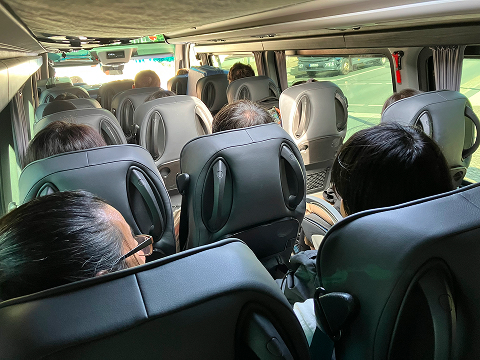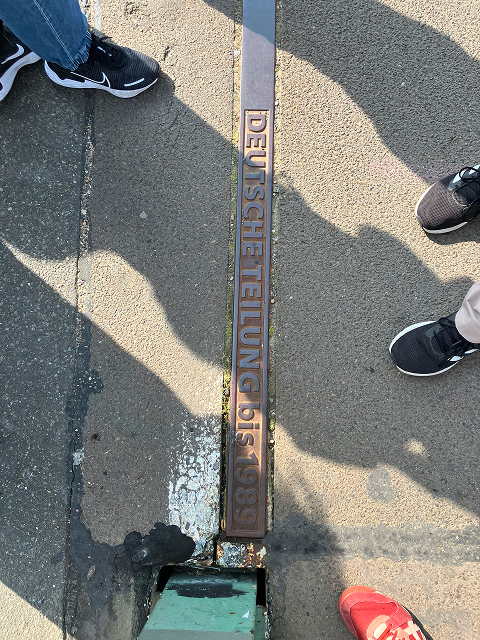2024 Germany
Attendance Report for the Summer School 2024 ( Germany )
September 25, 2024
Japan Society for the Promotion of Science Research Fellow CPD
In August 2024, I participated in the Summer School held in Jena and Berlin. As I am currently conducting long-term research abroad in Lithuania, this was the first opportunity for me to meet the project members in person and exchange opinions since I joined the International Reconciliation Studies Project in April this year. I was also able to meet with people from the Jena Center for Reconciliation Studies (JCRS), which is affiliated with the Friedrich Schiller University of Jena, and exchange opinions on reconciliation studies and other topics.
What was particularly impressive about this summer school was the emphasis on a practical perspective on how reconciliation studies can contribute to real society. I had prepared a presentation on my own research, but due to scheduling issues, I ended up giving it in Greece at a later date rather than in Jena. Nevertheless, I learned a lot from the interaction and exchange with the other participants.

At the JCRS, we first had a lecture by Professor Martin Leiner on the history of the development of the Center and the development of reconciliation studies. While reconciliation studies necessarily requires an interdisciplinary approach, Professor Leiner’s lecture was to the effect that an interdisciplinary approach is not enough and that a transdisciplinary approach is required for Reconciliation Studies. He also emphasized the importance of not only post-conflict reconciliation, but also prevention efforts before and during conflicts. In any case, I felt that the main focus of reconciliation studies is on how to engage with real issues, and that it places more emphasis on social significance than on academic significance. The participants in the International Reconciliation Studies Project are all experts in some academic field, but I felt that we are required to contribute not only academically in each field, but also practically in actual cases. However, in the field of history, which is my specialty, I feel that we should not assume any practical goals, at least during conducting academic research. This is because the purpose of historical research is to clarify historical facts, and the adoption of practical goals may hinder the clarification of historical facts that are “inconvenient” from a practical point of view. For this reason, I believe that historical research itself should be conducted separately from reconciliation studies. Of course, there is nothing to prevent reconciliation studies from using the results of historical research for the purpose of reconciliation, but it is important to be aware of the fact that reconciliation studies are different from historical research. The positioning of reconciliation studies as an applied science was also discussed in the Q&A session.
Next, Dr. Laura Villanueva gave a seminar on the methodology of reconciliation studies. This seminar also included group work on how to achieve reconciliation in a hypothetical case. Since the participants in the group work were from different academic fields, the discussion took place from different perspectives. While the participants specializing in education discussed the issue from a longer-term perspective, I tried to present the issue from a shorter-term perspective, focusing on how the problem could be resolved legally and politically. Through this group work, I realized that it is almost impossible for actors that hace completely different interests and are hostile toward each other to achieve reconciliation, at least in the short term, and I felt that it was important not to consider reconciliation, but rather what kind of compromise could be achieved. In the long term, reconciliation may be achievable, but in cases where, for example, the victims have already died, true reconciliation cannot be achieved in the absence of the victims; therefore, again, the key will be to consider what kind of compromise can be achieved rather than reconciliation. Dr. Villanueva also talked about the “Satoyama for Peace” project he is working on, using a real-life example.
After moving to Berlin, we visited the villa where the Wannsee Conference was held, the Cecilienhof Palace where the Potsdam Conference was held, the Reichstag, the Topography of Terror Museum, Checkpoint Charlie, and the Hohenschönhausen Memorial (the former Stasi prison). Of these, the exhibits at the Topography of Terror Museum and the Hohenschönhausen Memorial, which are related to the history of East Germany, were particularly important to me, since I specializes in East European contemporary history. At the Hohenschönhausen Memorial, we had free time about half an hour before the tour started, so I walked around the area on my own and looked at the Stasi-related facilities other than the memorial. The area where the Stasi-related facilities were located was very huge, and I could not see them all in half an hour, so I definitely would like to go back soon. Although some of the participants in the tour of the Stasi Museum were shocked by what they saw in the former prison, I was not so shocked, because I have visited the former KGB facilities in Lithuania, which I have visited many times for research purposes, and I feel that it was even more brutal than the Stasi prison. Rather, from the perspective of comparing the two, I was more interested in the differences between the methods of the Stasi and the KGB. As I have already been to the other places we visited, so I did not learn anything new there.
As for museums, I was able to visit the Stasi Museum and the museum about the regional history in Leipzig before moving to Jena. Both had important exhibits related to the history of the second half of the 20th century, and I was able to learn a lot of information that I had not known before. Leipzig is a city of great importance in the history of East Germany, and I was able to reaffirm how the anti-regime movement and the path to a unified Germany progressed there. Near Jena is Weimar, which is essential to understanding the history of the first half of the 20th century in Germany, but unfortunately I was unable to visit this time due to lack of time, so I hope to visit there in the near future.


